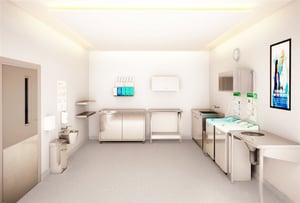
Utility Room Essentials: Utility Cabinets and Accessories
Stainless steel sluice room cabinets and other furniture
Human waste is one of the most prevalent carriers of dangerous bacteria in hospitals and care homes. So it is vital to ensure that your sluice rooms are easy to clean and disinfect.
For that reason, sluice room furniture is manufactured from stainless steel. It is tough and corrosion resistant so it can withstand regular cleaning and washing down with strong chemicals.
Two grades of stainless steel are used for sluice room furniture:
- 304 – the world’s most popular type of stainless steel; it’s the one used for cutlery
- 316 – marine grade stainless steel, which offers even greater protection against corrosion because the alloy contains molybdenum.
The furniture must have smooth surfaces (including the welds) to avoid the risk of creating dirt traps that could harbour dangerous pathogens. Smoother surfaces are easier to clean and therefore more likely to remain free from bacteria and other microorganisms.
Maintaining Hygiene And Compliance With Sluice Room Equipment
HTM 64-compliant sluice room furniture
Sluice room furniture in UK hospitals must comply with the requirements of Health Technical Memorandum (HTM) 64.
HTM 64 is a set of guidelines and standards developed by the UK’s Department of Health Estates and Facilities Division. It focuses on the design and installation of healthcare furniture, including sluice room equipment and sanitary assemblies.
HTM 64 provides guidance on the design, manufacture and installation of sanitary assemblies in healthcare facilities, with the goal of ensuring safety, hygiene and efficiency. The document covers various aspects of healthcare furniture, including materials, construction and infection control measures. It is particularly relevant to areas where sanitation and hygiene are critical – such as sluice rooms in hospitals and care homes.
For sluice room equipment, HTM 64 outlines standards for items such as sinks, worktops, and associated fittings to ensure they meet the specific needs of healthcare environments. Adhering to HTM 64 guidelines helps healthcare facilities to create safe and effective spaces for medical waste management, while maintaining compliance with industry standards and regulations.
Find out more about HTM 64 in this blog post about sluice room sinks.
Hospital sluice room furniture
Sluice room units required by hospitals typically include:
- Sinks – with wall-mounted taps and without overflows (to avoid creating a breeding ground for bacteria).
- Hand basins – options include knee-operated and corner units.
- Slop hoppers – for general disposal and cleaning. Features can include 360° rim flush action, anti-drip edges and a stainless steel flush pipe.
- Janitorial units – which combine a wash hand basin and a facility for filling and emptying buckets. The rear legs should be inset to accommodate the passage of pipes and services.
- Storage cabinets – with a right- or left-hand sink top, again with anti-drip edges and a cut-out at the rear for pipes and services.
- Specialist sinks for cleaning endoscopy equipment. These units can feature electromechanical adjustment for more comfortable operation.
Accessories – also manufactured from stainless steel – can include wall cabinets and racks, shelving, pedal bins, and dispensers for gloves, paper towels and soap.
Sluice room furniture for care homes
Like hospitals, care homes also need sinks, basins, slop hoppers, janitorial units and storage cabinets for their sluice rooms. The furniture’s technical features that prove so valuable in hospitals also help to prevent infection in care homes.
Care homes face similar infection-control challenges to those in hospitals. For that reason, their sluice room equipment must be equally strong and easy to clean and disinfect.
But while HTM 64 is a set of guidelines and standards developed for healthcare facilities such as hospitals, it may not be a strict requirement for UK care homes.
Care homes in the UK are regulated by different sets of standards and guidelines, often issued by different authorities. For care homes, compliance with Care Quality Commission (CQC) regulations is typically more relevant.
However, while HTM 64 may not be a mandatory requirement for care homes, they might still choose to follow some of its principles – especially if they have specific healthcare facilities within the care home environment, such as dedicated sluice rooms or medical waste management areas.
HTM 64 can provide valuable insights into best practices for designing and maintaining sanitary facilities in care homes as well as hospitals.
Choosing the right supplier of sluice room furniture
Quality is key because sluice room furniture will be installed in a challenging and demanding working environment, whether in a hospital or care home. Both operate 24/7 so the equipment will be used around the clock, all day, every day.
It pays to speak directly with a manufacturer because they will have specialist expertise. They can advise on the best sluice room layout and choice of equipment to suit your specialist requirements. Choose a manufacturer that has decades of experience.
Dealing with a single-source supplier offers many advantages:
- complete accountability from start to finish – avoiding the issue of different sub-contractors blaming each other for delays/issues
- a more efficient process – saving time and money
- a single point of contact (with a dedicated account manager) – for ease of administration.
Ideally, your chosen supplier should be able to offer complete sluice room refurbishments as a turnkey solution. They should be able to manage the entire process, including:
- supply and installation of medical pulp macerators or bedpan washer disinfectors
- supply and installation of sluice room furniture
- any necessary electrical or plumbing work
- refurbishment of the room with the correct hospital-grade flooring and wall coverings.
Ask your prospective suppliers about:
- certifications and approvals
- equipment guarantees and warranties
- a free site survey to ensure correct product specification
- whether they offer a rapid delivery service
- installation of the equipment and furniture.
Get expert advice on specifying sluice room furniture
DDC manufactures HMT 64 compliant stainless steel sinks, basins and other sluice room furniture under its Hygenex brand.









